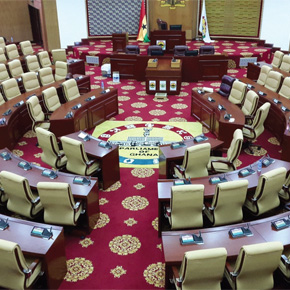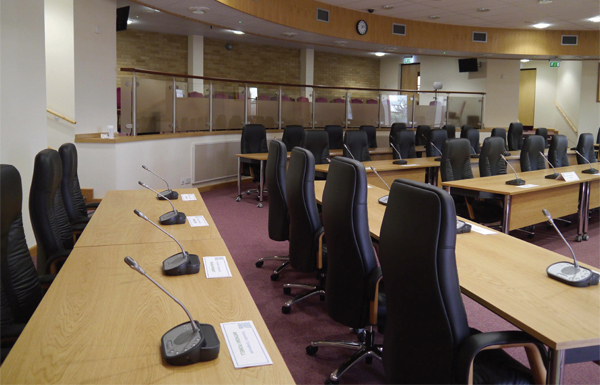
Digital conference systems: A local government necessity?
Meetings involving a large number of stakeholders are common in local government but traditional meeting scenarios are time (and therefore money) consuming, involve forests of paperwork and can be restrictive in terms of the circle of people who can be involved.
Commercial businesses use a range of IT tools and systems, including the latest conference systems, to make meetings more efficient, which local government could emulate. Alan Kemp, technical services manager at PEL Services explains how…
What are conference systems?
The primary function of a conference system is to ensure speech intelligibility; clarity and the ability to screen out interference from unwanted sounds is vital.
However, the more advanced Conference Systems on digital platforms go so much further, enabling the integration of audio, video and meeting content, along with internet access, as a complete package.
Each participant has a desktop console which has its own microphone, camera and screen. An operator PC forms part of the system to oversee meetings, control discussions and monitor processes. All data running through the system is securely encrypted.
What are the benefits of digital conference systems?
Clearly there are cost implications to installing a new digital conference system, but it is important to note that when existing equipment has become unreliable, marginal replacement costs can be further rationalised by selecting a system that operates over standard Ethernet networks (while remaining secure) rather than requiring a dedicated network, and that have been designed to be easy to use, i.e. that do not require an Audio Visual technician to operate.
Even then, can the benefits be justified when budgets are tight? You’d be surprised:
Improving efficiency – Valuing people’s time
A quality conference system provides exceptional audibility for all, including participants with a hearing disability, so there is often less repetition involved.
With a digital system, documents and presentations can be accessed instantly (with the correct authorisation of course) and shared with everyone on their own monitors in seconds, all in high resolution. No waiting required. Accessing information from the internet is also at the touch of delegates fingertips.
Last, but not least, if you have a digital system that features both video and audio, people who are located further afield could participate in the meeting remotely. This cuts down on travel and associated costs (also good for sustainability) and reduces the likelihood of people being late.
As a result, meetings can be scheduled and then run quicker and more efficiently.
Green thinking
The most obvious form of waste at a meeting is paper. A digital conference system enables a paperless meeting as all documents can be viewed on screen, even by remote participants.
The equipment itself can be very flexible, so pick wisely and opt for a conference system that can be readily expanded or upgraded without equipment redundancy.
Democracy in action – The information age
Using digital conference systems, participants can not only readily interact with each other via audio and video, but also with those not physically present, through the sharing of information in real time or even broadcasting the meeting live over the internet. It enhances the democratic process and encourages involvement.
Conference systems in action
PEL Services has installed many conference systems. Its most recent project, although for a central government, provides real life examples of the benefits to be had from such systems for local government to consider. The Ghanaian Parliament debating chamber in Accra recently underwent a complete refurbishment to accommodate an increase in the number of MPs.
The new chamber has been reshaped to ease congestion and completely refitted with new audio visual and communications systems to ensure the most effective use of the parliamentarians’ time. This has included a Bosch DCN Multimedia Conference System.
Delegates now have all the information they need at their fingertips using touch-screen interactive multimedia conference devices. This enables MPs to vote electronically, retrieve documents and share presentations in high resolution, as well as accessing the internet.
These features satisfy the parliament’s desire for a paperless environment. Superb speech intelligibility is guaranteed from the high directive technology incorporated into the conference device’s microphone, a built-in, two-way loudspeaker system which more accurately represents the sound spectrum and the system’s proprietary intelligent Acoustic Feedback Suppression.
HD cameras have been incorporated into the system that enable participants to clearly view the Speaker of the House and each participating delegate either on their desktop device or the curved large format LCD screens, and/or large screen projectors.
The conference system installed in the Ghanaian parliament may be a particularly large one and it may be overseas, but the benefits are readily transferable to local government in the UK.
These systems make for more efficient and effective communication and, in an era of austerity, that can’t be a bad investment.
Find out more in the August 2016 issue of Public Sector Building Magazine…
Latest news

29th April 2025
CPD Courses Available Online From Ecological Building Systems
Ecological Building Systems, a leading supplier of natural building products for sustainable construction, has revealed its comprehensive CPD programme for the year ahead.
Posted in Articles, Building Industry Events, Building Industry News, Building Products & Structures, Building Services, Continuing Professional Development (CPD's), Information Technology, Innovations & New Products, Insulation, Restoration & Refurbishment, Retrofit & Renovation, Seminars, Sustainability & Energy Efficiency, Training, Walls, Waste Management & Recycling
29th April 2025
WindowBASE launches new prospect databases at FIT Show
Visit WindowBASE at the FIT Show to see first-hand how it helps companies find new customers – the company is launching an easy-to-use, intuitive platform on Stand G16 at the NEC Birmingham from 29th April – 1st May.
Posted in Articles, Building Industry Events, Building Industry News, Building Products & Structures, Building Services, Doors, Exhibitions and Conferences, Glass, Glazing, Information Technology, Innovations & New Products, Posts, Publications, Research & Materials Testing, Restoration & Refurbishment, Retrofit & Renovation, Windows
28th April 2025
Nuaire first UK ventilation manufacturer to use low carbon-emissions recycled & renewably produced steel
Nuaire has announced that its Magnelis® steel based ventilations systems are now being made from XCarb® recycled and renewably produced steel.
Posted in Air Conditioning, Articles, Building Industry News, Building Products & Structures, Building Services, Building Systems, Heating, Ventilation and Air Conditioning - HVAC, Restoration & Refurbishment, Retrofit & Renovation, Steel and Structural Frames, Sustainability & Energy Efficiency, Waste Management & Recycling
28th April 2025
Renderplas: Builders avoid costly remedial work with PVCu render beads
A pioneer of PVCu render beads, Renderplas is helping the construction industry avoid the costly remedial work associated with rusting steel designs…
Posted in Articles, Building Industry News, Building Products & Structures, Building Services, Building Systems, Facades, Posts, Render, Restoration & Refurbishment, Retrofit & Renovation, Sustainability & Energy Efficiency, Walls
 Sign up:
Sign up: 